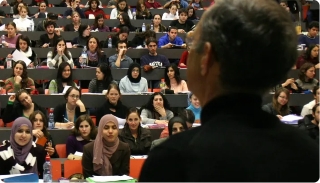A new horizon of the history of mankind opened at the end of the 20th century. Facing the new picture of the world, arising out of the growth of the technological culture, everything has to be thought about from now on, from assumptions of values, through principles of deed, to details of execution. The enormous, yet unknown, ability to move processes and generate results which go far beyond the circle of the individual and the generation raises the question of price. This book invites the reader to observe the great drama concealed in myriad of details and is called to take a stand about the necessary changes in opinions about the way of life of the individual and society.
From the book’s cover picture, the distant view of planet earth to the close-up of vibrations of the delicate organism of nature and human society from one end of the world to the other, the book will lead the sensitive and searching person to the recognition that the greatest human fate is hidden in the things that are the reality of life. The wide scope of complex problems may frighten and cause despair, however, it is also possible that in face of the opportunities and of the risks, wisdom and the willpower to shape a better world will prevail.
Only some thirty years have passed since the beginning of research on ecological issues, man’s “home theory”, and his existential environment1. During this short period tens of thousands of books and essays have appeared, tens of periodicals and hundreds of research and study institutions have responded to the warning. It is not as if the time has come to shed light on some hidden and neglected nook. A realization that there exists a completely new and quickly growing problem has burst into public cognizance. A problem that cultures of former generation did not even know existed. During those three decades it has grown continuously because of its proliferation in all areas of the world of action and also because of the depth of its influences on present and future generations. All of the ecological literature is based on the exciting picture of planet earth as photographed from a satellite on its way to the moon. There it was, a not to large a ball, lonely and sensitive in the “blue sea” of space, just like a ‘satellite’ or a ‘life boat’2, whose passengers must manage their activities wisely. The switch in understanding the world is indeed, revolutionary. Before it man considered his world to be a safe home, a horn of plenty with its treasures guaranteed for him and his descendants till the end of history. If there was a sense of shortcoming it was attributed to the social order for not allocating the riches to all, and if only this deficiency would be corrected, planet earth will go on carrying all its happy dwellers. All this has now crumbled: security was replaced with anxiety and the feeling of plenty was replaced by a cognizance of distress.
The characteristics of the technological culture feed the terror of danger. The ability of Man to cause far reaching results is significantly greater than that of previous generations, and the rate of change is so fast that it casts doubts on the ability to plan in a wise and controlled manner. At this time humanity is in the trap of a vicious cycle: because the existential dangers are so real and immediate the historic horizon has been lost and only the drive to live the moment (“eat and drink for tomorrow we die”) remains, and the loss of the historic horizon and the drive to exploit the pleasures of the new day increase the perils of existence. Social trends, anchored in outlooks on the reason for life and on the principles of action towards its realization, hamper expanded planning since they attach priority to solving immediate problems of place and time.












